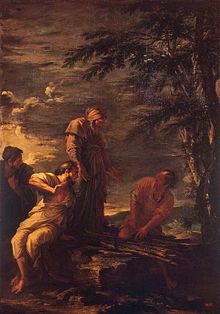Protagoras
Appearance
- For the dialogue by Plato, see Protagoras (dialogue)


Protagoras (c. 481 BC – c. 420 BC) was an ancient Greek philosopher. He was a pre-Socratic philosopher and is numbered as one of the sophists by Plato, who in his dialogue of the same name credits him with having invented the role of the professional sophist or teacher of "virtue".
Quotes
[edit]- Man is the measure of all things: of things which are, that they are, and of things which are not, that they are not.
- As quoted in Theaetetus by Plato section 152a
- There are two sides to every question.
- As quoted in Lives of Eminent Philosophers, by Diogenes Laërtius, Book IX, Sec. 51
- As touching the gods, I do not know whether they exist or not, nor how they are featured; for there is much to prevent our knowing: the obscurity of the subject and the brevity of human life.
- Opening lines of Concerning the Gods (DK 80 B4).
- Variant translation: "As to the Gods, I have no means of knowing either that they exist or that they do not exist, or if they do, what they are like."
- The Athenians are right to accept advice from anyone, since it is incumbent on everyone to share in that sort of excellence, or else there can be no city at all.
- As quoted in Protagoras by Plato
- When it comes to consideration of how to do well in running the city, which must proceed entirely through justice and soundness of mind.
- As quoted in Protagoras by Plato
- You, Socrates, began by saying that virtue can't be taught, and now you are insisting on the opposite, trying to show that all things are knowledge, justice, soundness of mind, even courage, from which it would follow that virtue most certainly can be taught.
- As quoted in Protagoras by Plato
External links
[edit] Encyclopedic article on Protagoras on Wikipedia
Encyclopedic article on Protagoras on Wikipedia- "Protagoras", in Internet Encyclopedia of Philosophy’’
- "Protagoras", in Stanford Encyclopedia of Philosophy
